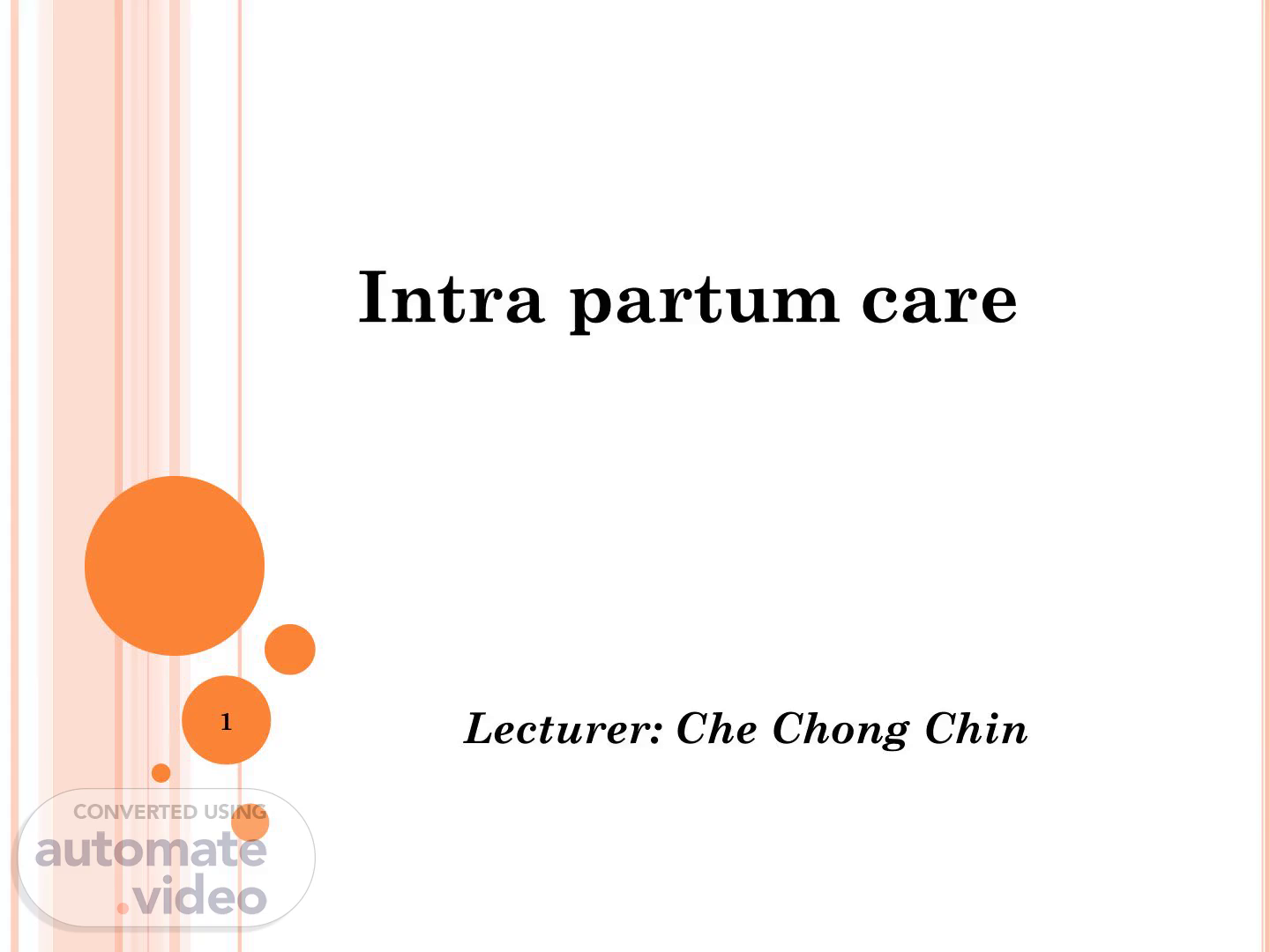Scene 1 (0s)
[Audio] Intra partum care 1 Lecturer: Che Chong Chin.
Scene 2 (6s)
[Audio] Learning Outcomes At the end of the lecture, the students are able to: 1. Define labor 2. Describe signs of labor. 3. Differentiate between false labor and true labor. 4. Explain stages of labor. 5. Describe nursing care on different stage of labor. 2.
Scene 3 (30s)
[Audio] LABOR Labor is a series of continuous, progressive contractions of the uterus which help the cervix to open (dilate) and to thin (efface), allowing the fetus to move through the birth canal. 3.
Scene 4 (44s)
[Audio] TYPES OF DELIVERY 1.Vaginal delivery - normal vaginal (Spontaneous vaginal delivery) - abnormal vaginal - breech presentation - brow presentation - shoulder presentation - face presentation - Instrumental assisted delivery 2. Abdominal delivery - Caesarean section 4.
Scene 5 (1m 8s)
[Audio] Delivery suite S5. S5 Delivery suite.
Scene 6 (1m 14s)
[Audio] Equipments in labour room JUNE 2016 6. JUNE 2016 6 Equipments in labour room.
Scene 7 (1m 20s)
[Audio] JUNE 2016 7. JUNE 2016 7.
Scene 8 (1m 26s)
[Audio] signs of labor 1. Bloody show Mucus + slightly mixed with blood 2. Contractions ↑ frequency, duration and intensity 3. Rupture of amniotic sac membranes (water bag) 8.
Scene 10 (1m 48s)
[Audio] False labor 1. Contractions are irregular and unpredictable 2. Membranes will not rupture 3. No bloody show 4. Cervix does not change in effacement or dilatation 10.
Scene 11 (2m 4s)
[Audio] Stages of labor Begins with regular contractions and ends with cervix completely dilated (10 cm) First stage Second stage (Pushing stage) Begins with the cervix is completely dilated and ends when the fetus is expelled Third stage Begins with the birth of the baby and ends with the expulsion of the placenta 11.
Scene 13 (2m 32s)
[Audio] FIRST STAGE OF LABOR Nursing care : 1. Environment and positioning 2. Documentation and communication 3. Emotional support 4. Hydration and nutrition 5. Prevention of infection 6. Elimination 7. vital signs monitoring 13 8. Pain management.
Scene 14 (2m 54s)
S14.
Scene 15 (2m 59s)
S15.
Scene 16 (3m 5s)
16.
Scene 17 (3m 10s)
Spinal cord Epidural space adam.com.
Scene 19 (3m 22s)
[Audio] SECOND STAGE OF LABOR 1. Positioning 2. Observation 3. Continuous labor support 4. Prevent injury 5. Newborn care 19.
Scene 20 (3m 34s)
[Audio] SIGNS OF 2ND STAGE Vulva distended Anus distended Perineum bulgingPresenting part can be seen 20.
Scene 21 (3m 44s)
[Audio] STEPS DURING DELIVERY 21. STEPS DURING DELIVERY 21.
Scene 22 (3m 50s)
[Audio] NURSING DIAGNOSES IN THE SECOND STAGE 1. Risk for injury 2. Disturbed sleep pattern related to the length of labor 3. Deficient knowledge related to normal labor and delivery 4. Pain related to uterine contractions 5. Fear or anxiety 22.
Scene 23 (4m 11s)
[Audio] THIRD STAGE OF LABOR Signs of placental separation 1. The uterus becomes globular in shape and firmer. 2. The uterus rises in the abdomen. 3. Lengthening of the umbilical cord. 4. Sudden gush of blood 23.
Scene 24 (4m 30s)
S24.
